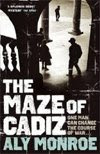One niggling business in editing is the sentence that just will not read right. There is nothing particularly wrong with the sentence. All its words are in good order, the sentiment is not complicated but a reader will trip on it. I include myself as one of those readers.
It can be down simply to how people see when they read. The word ‘inexpensive’, for example, should not end a sentence. In the run of reading, a lot of people, myself included, tend to see ‘expensive’. This is something well known to advertisers – ‘Not’ is a no-no in a slogan. ‘Not fattening’, for example. The opposite impression is left in the mind of a consumer.
I have had some relief from the necessary fiddle of editing because my husband recently gave me the Penguin collection of all five novels about Richard Hannay written by John Buchan.
The most famous of these is of course the first, The Thirty-Nine Steps. I had read two others, Greenmantle and The Three Hostages. The two I had not read were Mr Standfast and, the one I am going to mention here, The Island of Sheep.
In Chapter Six – Sundry Doings at Fosse – Richard Hannay calls in on MacGillivray and finds him reading Greek, ancient Greek that is. Though MacGillivray is in his rooms in Mount Street , he works at ‘the Yard’ (Scotland Yard). He refers to and translates from Herodotus and in his description of Lancelot Troth, the man Hannay is interested in says ‘- he leads the apolaustic life, and that’s an expensive thing nowadays.’
Vocabulary in those ‘nowadays’ was different from these ‘nowadays’. I think I’m on pretty safe ground in saying that not many thrillers published this year will include the word ‘apolaustic’ (devoted to pleasure). I have no idea how many high ranking officers at ‘the Yard’ now seek consolation and wisdom in the classics.
In any case I very much doubt that ‘apolaustic’ was in common usage in 1936 either, but presumably Buchan thought that his younger readers could always look it up in a dictionary.
No, I am not going to defend ‘apolaustic’ or say ignorance of its meaning will prevent a full and happy life. We get along reasonably well without it and not many of us want to suggest something short of hedonism but, as it turns out in the novel, the kind of enjoyment that involves having a six hundred ton yacht. I can think of other terms for a person like that.
It will happen to us all, of course with time, but one of the incidental pleasures of reading Buchan is the sometimes sniffy attitude of his hero Hannay. Forget the six hundred ton yacht, this is more from the first class lounge of an ocean liner:
“I pondered long over that letter. The first thing that struck me was that it was not written in Sandy’s usual fastidious style. It was frank journalism and must be meant to appeal to a particular audience.”
And I am particularly fond of “the most sumptuous of Lombard’s possessions” – referring to Mrs Lombard. “As a girl she must have been lovely, and she was still a handsome woman of the heavy Madonna type – a slightly over-coloured Madonna. Being accustomed to slim people…I thought her a little too ‘fair of flesh’, in the polite phrase of the ballads.”
Now in Washington Shadow, I let an African character give Buchan something of a going over, particularly as regards Prester John. Buchan could be and was, as someone has limply said, ‘as racist as his time.’
Buchan’s fluency of style and wide vocabulary are a saving grace? I admire them but that’s not my point here.
History is a tracing back to see how we are what we are. To deny the inconveniences of a text – as in the new, modern version of Huckleberry Finn, (see here and here) in which vocabulary and expressions from the original text were changed - is a mistake. It’s particularly a mistake in Mark Twain’s classic because it bowdlerizes the text of Twain’s irony.
It is even more patronizing to the reader than Buchan could be to some characters.






